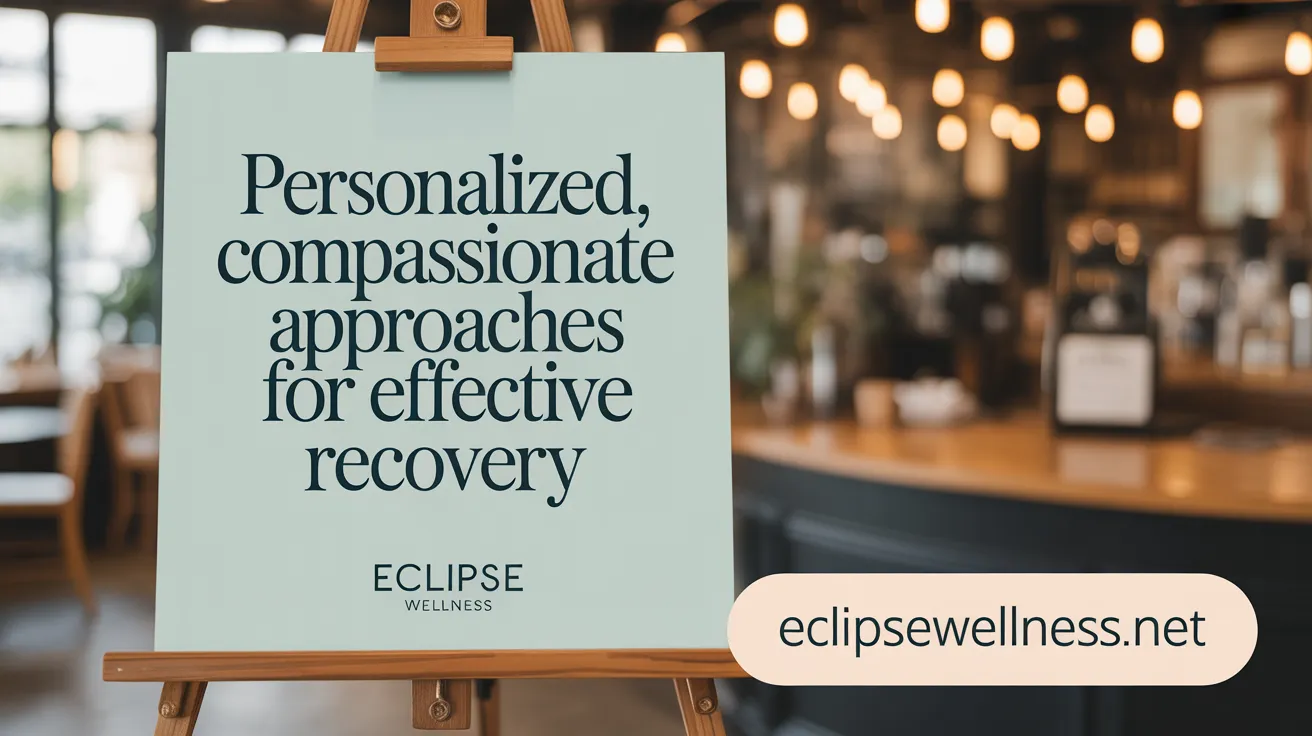The New Paradigm in Addiction Recovery
Addiction recovery programs are increasingly embracing compassionate care as a cornerstone for effective treatment. Recognizing addiction as a complex, chronic disease influenced by biological, psychological, and social factors, compassionate care techniques help break down stigma, foster trust, and enhance treatment engagement. This article explores how empathy, personalized approaches, and evidence-based compassionate interventions reshape recovery journeys, supporting sustained sobriety and emotional healing.
Foundations of Compassionate Care in Addiction Recovery

What are the key principles of compassionate care in addiction recovery?
Compassionate care prioritizes kindness, respect, empathy, and a non-judgmental approach. It creates a safe, supportive space where individuals with addiction feel understood and valued, fostering trust and openness essential for recovery.
How does empathy and a non-judgmental attitude influence treatment?
Empathy involves deeply understanding patient suffering, while a non-judgmental attitude removes stigma and shame. Together, they build emotional safety, making patients more likely to engage in treatment and adhere to recovery plans.
What is the neuroscientific basis for compassionate care in addiction treatment?
Research reveals empathy triggers oxytocin release, helping reduce stress and cravings. Compassionate interactions activate the prefrontal cortex, which governs emotional regulation and decision-making, supporting resilience and lowering relapse risk.
How do compassionate environments foster healing?
Such environments encourage patients to confront underlying trauma and emotional pain without fear. They promote self-compassion, reduce shame, and boost motivation, ultimately improving treatment outcomes and supporting long-term sobriety.
Integrating Evidence-Based Treatment with Compassion

How does compassionate care integrate with evidence-based addiction treatments?
Compassionate care enhances evidence-based addiction treatments by creating a personalized and supportive environment where therapies are delivered with empathy and respect. This approach not only addresses the biological and psychological aspects of addiction but also attends to the emotional and social needs of each individual.
[Medication-Assisted Treatment (MAT)] is a cornerstone of evidence-based care, employing FDA-approved medications such as Suboxone, Buprenorphine, and Vivitrol. These medications help manage withdrawal symptoms and cravings, improving patients' ability to engage in recovery while compassionate care ensures patients feel safe and understood throughout the process.
Behavioral therapies including Cognitive-Behavioral Therapy (CBT), Dialectical Behavior Therapy (DBT), and Motivational Interviewing play critical roles in modifying thought patterns and behaviors related to substance use. Delivered within a compassionate atmosphere, these therapies foster trust and encourage patients to confront challenges without fear of judgment.
Holistic and experiential therapies such as art, music, equine therapy, and mindfulness exercises complement traditional treatments by engaging patients emotionally and physically. These therapies promote greater emotional regulation, resilience, and self-awareness, vital elements for sustained recovery.
Tailoring treatment plans to individual needs is essential. Compassionate care teams listen without judgment and meet patients where they are, adapting methods and intensities based on personal history, co-occurring conditions, and preferences. This integrated model maximizes treatment effectiveness and supports the journey toward a healthier, more stable life.
The Role of Self-Compassion in Sustaining Recovery

What is self-compassion and how is it practiced in addiction recovery?
Self-compassion means treating yourself with kindness, understanding, and patience, especially during the hardships that come with recovery. It involves recognizing your struggles without judgment and responding with encouragement rather than criticism. Daily practices that support self-compassion include mindfulness exercises like meditation and journaling, gratitude reflections, and establishing healthy boundaries. These help individuals stay connected to their progress and maintain emotional balance. For more on practicing self-compassion during addiction recovery and tips for treating yourself with kindness and patience, see resources by The Walker Center.
Why is managing guilt, shame, and self-criticism crucial?
Addiction often comes with feelings of guilt, shame, and harsh self-judgment. Self-compassion provides a way to counter these negative emotions. By fostering forgiveness toward oneself after setbacks, individuals can prevent spiraling into relapse and maintain motivation. Learn more about self-compassion benefits in addiction recovery and reducing shame in addiction treatment.
How do mindfulness and daily self-care routines support recovery?
Mindfulness helps people observe their emotions and thoughts without judgment, reducing stress and negative reactions. Incorporating activities like deep breathing, journaling, meditation, exercise, and maintaining good sleep and nutrition habits reinforces self-compassion and emotional well-being. For more details on daily self-compassion rituals and self-care in addiction recovery, see articles by The Walker Center and PMC.
What role does self-compassion play in building emotional resilience and motivation?
By encouraging positive self-talk and patience with the recovery process, self-compassion strengthens emotional resilience. It promotes motivation through recognizing small successes and encourages a long-term commitment to healing and healthier living. Resources offering insights on building resilience with positive self-talk and compassion's role in addiction recovery are highly recommended.
Through these compassionate self-care approaches, individuals can better sustain their recovery journey, reduce relapse risk, and build a foundation for lasting well-being. Additional support and strategies can be found in Compassionate Addiction Care and Compassionate Care in Addiction Treatment.
Combating Stigma Through Compassionate Communication
How does compassionate communication reduce stigma and foster trust in addiction treatment?
Using people-first, non-stigmatizing language is a foundational step in combatting stigma. Terms like "person with substance use disorder" shift the focus from the individual's condition to the person themselves, reducing negative labeling.
Establishing trust with patients involves creating a safe and supportive environment. Asking permission before discussing sensitive topics and being transparent about treatment fosters patients’ comfort and willingness to share openly.
Active listening and validation techniques play a crucial role. Healthcare providers who listen attentively, validate experiences, and acknowledge the courage involved in seeking help help patients feel understood and respected.
This compassionate approach encourages openness and enhances treatment engagement. Patients are more likely to participate fully in their recovery when they feel safe from judgment and stigma.
Overall, compassionate communication builds a strong therapeutic alliance, essential for successful addiction recovery outcomes.
Family and Community Support Rooted in Compassion
How does compassion influence support systems during addiction recovery?
Compassion plays a crucial role in strengthening the support systems surrounding individuals recovering from addiction. When family, friends, and the wider community offer compassionate care in addiction treatment, they create a nurturing and non-judgmental addiction treatment environment that fosters healing and long-term recovery.
Family involvement and education in recovery
Families that engage with loved ones' recovery using compassionate, informed approaches can significantly influence outcomes. Family-focused interventions, such as the Community Reinforcement and Family Training (CRAFT) equip relatives with skills to encourage treatment entry and improve their emotional well-being. By understanding addiction as a chronic brain disease and recognizing their loved one's struggles without blame or judgment, families become pillars of support.
Community reinforcement approaches
Community reinforcement approaches emphasize rewarding positive behaviors and providing social support. Compassion within these programs encourages patience and understanding amidst challenges, including relapse. Educating the community to reduce stigma helps create an inclusive atmosphere where individuals feel safe seeking help, supported by behavioral health and recovery awareness resources.
Peer support groups and networks
Peer support groups like Alcoholics Anonymous (AA) and Narcotics Anonymous (NA) offer empathetic spaces for sharing experiences and mutual encouragement. These groups help reduce feelings of isolation by connecting individuals to others who understand addiction firsthand. Compassion within peer networks fosters trust, accountability, and hope.
Balancing supporter self-care and boundaries
Supporting someone through recovery can be emotionally demanding. Compassion not only extends to those with addiction but also to their supporters. Maintaining personal boundaries and prioritizing self-care are essential for sustaining emotional resilience. This balance prevents burnout and enables supporters to provide consistent, loving care, as outlined in tips for treating yourself with kindness and patience during recovery.
Ultimately, cultivating compassion throughout family and community circles builds strong, empathetic support systems that empower individuals in recovery to heal and sustain sobriety, consistent with principles of compassionate care and evidence-based addiction interventions.
Implementing Harm Reduction with Compassion and Respect
What are harm reduction strategies that incorporate compassionate care?
Harm reduction strategies recognize addiction as a chronic brain disease, focusing on compassionate care for addiction with nonjudgmental compassionate care and interactions that prioritize patient dignity and well-being. These approaches aim to reduce the negative health effects associated with substance use while supporting individuals toward recovery.
Healthcare providers educate patients on crucial topics such as disease transmission prevention, including hepatitis C testing and treatment, overdose recognition and response, wound care, and the safe disposal of injection equipment. This education empowers individuals with practical knowledge to protect their health and the health of those around them.
Nurses and medical staff serve as essential pillars in delivering harm reduction with empathy and compassionate care. Their frequent patient contact enables them to build trusting relationships that counteract stigma and encourage honest communication. Compassionate care fosters emotional safety, making patients more receptive to guidance and treatment.
Through tailored addiction recovery plans that meet patients where they are, compassionate harm reduction emphasizes safety rather than judgment. By coupling education with empathy, healthcare teams promote healthier behaviors and pave the way for access to evidence-based addiction interventions, counseling, and recovery resources.
This respectful approach helps overcome negative provider attitudes historically linked to addiction care, ultimately improving health outcomes and advancing the journey toward long-term recovery support.
Training and Workforce Development to Sustain Compassionate Care
How can addiction recovery programs ensure sustained compassionate care?
Sustaining compassionate care in addiction recovery programs hinges on comprehensive professional training. Clinicians benefit immensely from education in empathy and emotional intelligence, and trauma-informed care techniques. These skills enable providers to connect deeply with patients, fostering trust and enhancing treatment adherence.
Professional training in empathy and emotional intelligence
Training programs equip healthcare professionals with tools to better understand and respond to patient emotions. This goes beyond clinical knowledge to include active listening, validating experiences, and managing complex emotional dynamics. Such skills optimize patient engagement and can lead to improved recovery outcomes.
Addressing compassion fatigue and burnout
Compassion fatigue poses a significant risk to maintaining empathy in challenging care environments. Addiction recovery settings can be emotionally taxing, requiring systems to proactively address burnout. Organizational strategies such as employee wellness programs, peer support groups, and regular debriefings help sustain caregivers' mental health and compassion. Research on compassion training and addressing clinician burnout supports these approaches.
Tools like Behavioral Health Workforce Career Navigator
Resource tools like SAMHSA’s Behavioral Health Workforce Career Navigator provide vital support in workforce development. This platform guides clinicians through credentialing and licensure requirements, ensuring programs are staffed with qualified personnel trained in compassionate care principles.
Organizational support and culture fostering compassion
Creating a workplace culture that values compassion is critical. Leadership commitment to emotional support, open communication, and professional growth encourages staff to prioritize compassionate care. An environment that recognizes and rewards empathetic engagement sustains high-quality addiction recovery services.
Together, these strategies form a robust framework to ensure compassionate care is not only delivered but maintained over time, promoting better healing for individuals in recovery.
Compassion as the Cornerstone of Effective Addiction Recovery
Compassionate care techniques integrate empathy, respect, and individualized evidence-based treatments to transform addiction recovery. This approach fosters emotional safety, combats stigma, and promotes self-compassion, empowering individuals to navigate the complexities of recovery with resilience and hope. Incorporating compassionate communication, family and community engagement, harm reduction strategies, and workforce training creates a comprehensive support system essential for long-term success. As addiction recovery programs continue to prioritize compassion, they pave the way for more humane, effective, and enduring healing journeys.
